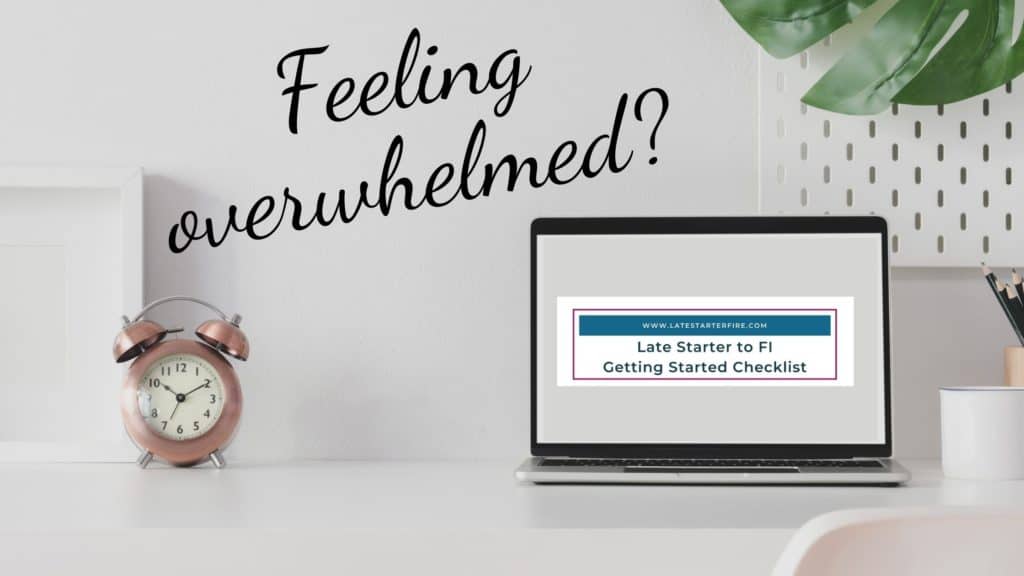Welcome to the Late Starter to FI series!
I am a Late Starter – I did not discover FIRE (Financial Independence Retire Early) concept until I was 47. This was way later, I thought than others who seem to have it all together in their 20s and 30s.
Since I started to write about my own journey, I have discovered there are many more Late Starters like me, yay! It is such a relief knowing I am not alone.
I want to share our stories, our unique perspectives and show that it is absolutely not too late for us.
So in this series, I particularly highlight those of us who start our FI journeys in our 40s, 50s and 60s. And explore questions such as ‘where do we start’, ‘can we still retire early(ish)’, ‘what are the specific challenges for us late starters’. We look at our past, not to castigate ourselves but so that you can learn from us.
Please join in the conversation in the comments below. I encourage you to share your story if you fit the profile of a late starter. You absolutely don’t have to be a blogger or podcaster to share your story.
Please email me at info@latestarterfire.com or connect with me on Twitter or Facebook or Instagram
And if you’ve missed any previous stories, you can catch up here – Late Starter to FI series
Disclosure: Please note that I may benefit from purchases made through my affiliate links below, at no cost to you. Additionally, as an Amazon Associate, I earn from qualifying purchases

I first heard late starter, Tom speak about his journey on FI After 40’s podcast (Edit – no longer available) and knew I had to invite him to share his story here. Tom writes at What The FI to “help the average person with strategies and tips for saving, investing and achieving larger financial goals.”
Here is Tom in his own words …
A little about me
I live just outside Chicago, Illinois and have been an 8th grade language arts public school teacher for 25 years. I just turned 48 years old, happily married with two young boys who keep me busy and laughing non stop.
We love the outdoors, jumping in the lakes, hiking, exercising and exploring new places. My wife is just as passionate about health and fitness as I am about financial independence. It makes for a healthy dynamic and keeps us motivated and constantly learning.
Lightbulb moment
At one point, my wife and I had a combined income of $140k yet still lived pay check to pay check. Money in, money out. Lifestyle creep set in and it became harder each year to make ends meet.
Eventually we had children and my wife had to leave her job to stay home with the kids. And due to a lack of financial planning, we started to incur debt. We lacked the financial mindset to budget, so we couldnt’t figure out what was wrong.
I thought of starting a new job that might improve my income but found little opportunities I would enjoy. My frustrations started to show in my work and at home. Thankfully my wife knew I needed a mindset shift.
She showed me a youtube video of a Chicago police officer who had some of the same frustrations and began investing in real estate – Jemal King, the 9-5 Millionaire. For some reason, this was my spark.
I began learning and reading as much as I could about this thing called ‘passive income’. It started with Rich Dad Poor Dad (my spiritual guide) and morphed into 50 books about finance.
I shifted from a scarcity to abundance mindset and saw opportunities all around me that I was never aware of before.
I began eliminating our debt, built our savings rate to 53%, bought a cash flowing rental, got rid of subscriptions, leases and other boneheaded financial decisions (ie moved from actively managed funds to index funds, dropped whole life insurance, ended car leases).
I even started a blog about our journey at whatthefi.com and try to help others understand how they can turn around their financial situation.
Today, we are happier, motivated, and on our way to becoming financially independent.
First steps on the path to FI
Reading, reading, reading. I’ve read so many books on finance that sometimes I dive into a book and forget I already read it! I also listen to tons of financial podcasts and continue to learn from others on blogs and instagram.
At this point, we are building money and strategising for our next move. It’s exciting for us. Two years ago, our only strategy was merely how we were going to make ends meet. New world now.
How far along the path to FI are we now?
I feel like we are FAR beyond where we were two years ago but also in the beginning stages. Probably the hardest thing was saving enough money for a $1k emergency fund. Now that fund is approaching $20-$30k, it opens up a new world of opportunities.
We will have a choice pretty soon to dive into rentals for extra income, throw it all into retirement funds, or pay down our mortgage. Maybe all 3 options – who knows?
The point is any extra money we get will work for us from now on and buy us our time in the future. AND any unforeseen debt will be more like a bump in the road due to our sinking / emergency funds.
My goal is to not be working by 55 on anything I don’t have a passion for. If it still is with teaching, fine. But I’m starting to feel the burnout.

Feeling Overwhelmed?
Use this FREE Checklist to start your journey to Financial Independence
Our current financial situation
We have:
– Improved our net worth from 115k to 333k within a few years
– Improved our savings rate from nearly 0% to 53%
– Have a 4.2 month emergency fund (counting sinking funds)
– Developed several sinking funds (birthday/gift fund, Christmas fund, car/house capX fund, summer deferred pay fund, date night fund, and now dog fund)
– Started “flex” pay with our health care that deducts $1k pre tax (basically a health care sinking fund)
– Went from $175 per month contribution to our tax deferred 403b retirement fund to $500 per month
– Opened two Roth IRA and contribute $250 in each and contribute $200 per month into 529 plan and throw in extra $ when we can
– We plan on improving all the retirement/college funds as soon as we reach 6 month emergency fund
– We also purchased our first rental last year that pays us $560 cashflow per month. We plan on buying another rental at the end of this year or next year if we have enough saved
– Had two car payments and are down to one. It was a (dumb) car lease that will not be renewed when it ends next year. We plan on buying a used car in cash when we turn it in. After the cars our only major debt will be our mortgage which we will hopefully start to really attack next year.
I wrote about How We Found $6000 By Cutting Every Day Expenses
Thoughts on early retirement
Obviously I am a bit late getting started and I knew my retirement could be at age 55. At 55, I will have 75% pension but will have extra to pay in health care. Retirement at early age was a major goal of mine but I noticed lifestyle creep was killing this hope.
I needed to start paying down debt, developing a large savings rate and adding as much extra income to support the idea of retiring at 55.
I don’t feel like I will fully retire at 55 but rather, stop the daily 9-5 grind. I may substitute teach, dive into real estate, or even possibly become a realtor. The point is that I will have the CHOICE to do what I want rather than work for W2 income for the rest of my life in order to pay our bills.
How my relationship with money has changed
Ugh, where to start. When I was single and in my 20s to early 30s, I was trying to keep up with the Joneses so much I couldn’t recognise myself. I definitely was not “acting my wage”.
In my 20s, I remember building up so much credit card debt I would have to refinance my home just to pay it off.
When I turned 30, I stopped with the credit card debt but mistakenly thought that money would just build if I paid off the balance each month.
I didn’t understand lifestyle creep at the time and it still felt money in , money out.
When I got married, we continued this behaviour. Instead of settling in one home and paying it down, I’ve moved into THREE homes in the ten years we’ve been married. Each one just wasn’t enough room.
Basically we played the traditional consumer role. Money was paid by our bosses, and our job was to spend it as soon as possible.
We now see money as a tool and use it to work for us as much as possible. We track our net worth weekly, have money planning discussions, eat out less and meal plans per month, find joy in exercise and experiences instead of online purchases or gifts, and save for our future.
Specific challenges or advantages of starting late
The biggest challenge is that time is not on your side as let’s say a 20 year old, for compounding interest on investments.
The advantages are we are probably in our biggest earning years right now so we can build up reserves a lot quicker than I did in my 20s.
Will we reach FI?
It’s not if but when for us. I’m hoping by 55, we can reach a level of FI where we can choose if we want to keep working or not. We have most of our money now working for us but need the time to build.
Our bigger goal was to have 2-3 rentals by now but we had to pause due to my wife being temporarily laid off. We may have this by next year.
What's next?
Reading, saving and buying assets. I hope to read more of your blog and share the journey 🙂
Back to Latestarterfire
Thank you for sharing your story, Tom!
I love sinking funds too – there is just something about naming an account that makes it really clear what it can be used for and you know exactly what you are saving for. I started with one and at last count, have 8!
Once again, Tom has demonstrated that we can achieve great results when we have a plan to move forward. You’ve made so much progress in two years!
And finally, your confidence of WHEN you will reach FI (not IF) just shines through!
Looking forward to reading more of your journey in the years ahead.


